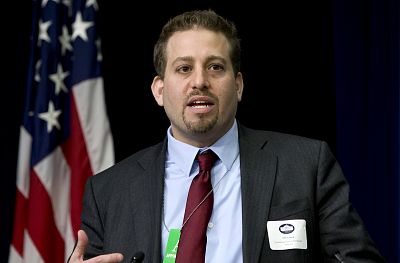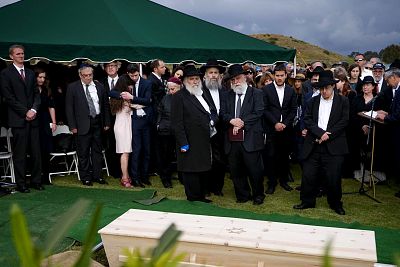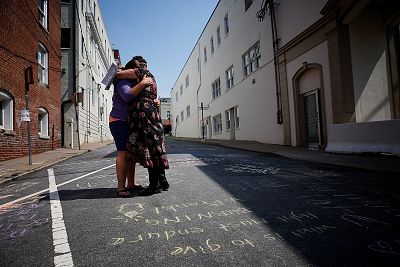Law enforcement doesn't have the same tool kit to fight domestic terror that it can use to fight international terror, say legal experts and ex-FBI agents.
In a windowless office in Midtown Manhattan, two researchers huddle over a computer screen reading a four-paragraph message targeting Jews just posted to 4chan, a fringe social media site popular with white supremacists.
"I will dance for joy if more synagogues in the United States are attacked," the anonymous poster writes.
Oren Segal, who leads a dozen-person team at the Anti-Defamation League Center on Extremism that tracks extremists around the clock, tells his researchers it's time to alert law enforcement.
"We definitely want to get this to [the FBI]," says Segal, whose team has been on heightened alert following deadly shootings at two U.S. synagogues since October 2018.
Segal is frustrated by the anonymous nature of the threat, but notes, "We've found people with less [identifying information]...What we need to do is identify other people who are interacting with this and see if we can find a location."
He also says, "This is a typical Monday."
The ADL team tracks extremists of all kinds online, including neo-Nazis and would-be jihadis. In the past two years, according to Segal, his researchers have been identifying more potentially violent white supremacists than Islamist extremists. Killings by white supremacists in the U.S. vastly outpaced those by Islamist extremists last year, according to ADL statistics.
The U.S. justice system has not yet caught up with this trend, say critics, who believe the federal government needs to update its response to domestic extremists — changing criminal statutes and adding investigators — to confront the rising threat of right-wing violence. On Wednesday afternoon, an expert from the ADL and Susan Bro, the mother of a woman killed by an extremist during the Charlottesville, Virginia, protests of 2017, will testify before the House Oversight Committee about the need to crack down on violent right-wing extremists.
Following the 9/11 attacks, the U.S. government took an aggressive stance towards preventing and punishing acts of Islamist-inspired violence inside U.S. borders, defining it as "international terrorism." The FBI was given a wide range of tools and resources to investigate and prosecute individuals who provide material support or resources to one of the 68 designated international terrorist groups, including ISIS and al Qaeda. Perpetrators have been charged with federal terrorism-related crimes that get a lot of media attention.
In contrast, there is no domestic terrorism statute. Cases involving white supremacists are not prosecuted in federal courts under terrorism statutes because they don't involve government-designated "foreign terrorist organizations." They often land in state courts, becoming drug, fraud or murder cases, and frequently don't get as much attention.
Law enforcement simply doesn't have the same robust tool kit to address domestic terrorism that it can use to fight international terrorism, according to legal experts and former FBI agents interviewed for this article. Meanwhile, statistics compiled by a variety of groups that follow terror prosecutions show that in recent years the U.S. has seen a growth in bias-related hate crimes and a decline in international terrorism cases.
According to the Center on National Security at Fordham Law School, there were 83 indictments related to ISIS or al Qaeda in 2015. The number of comparable indictments for 2018 was 15, a significant drop.
During the same time period, hate crimes and killings by white supremacists have spiked. Of the 50 murders carried out by extremists in the U.S. in 2018, 78 percent were carried out by white supremacists and one was carried out by an Islamist extremist, according to the ADL.
The FBI's most recent available data shows that hate crimes increased by 17 percent from 2016 to 2017.
Mary McCord, former acting assistant attorney general for national security at the Justice Department is advocating for a change in the law that would put domestic terrorism on the same "moral plane" as international terrorism and direct more resources towards preventing the domestically based terror threat.
"There's not much difference between a home grown violent extremist [inspired by ISIS] and a person doing it for white supremacist reasons," said McCord, now at the Georgetown University Law Center. Both have been radicalized to violence, often via social media, following others with similar views."
She cites 19-year-old John T. Earnest, who killed one and injured three at a synagogue in Poway, California, on April 27 as an example. "If Earnest had committed the same crimes on behalf of a foreign terrorist organization like ISIS," she said, "he would be charged with multiple federal crimes of international terrorism, but because there is no federal terrorism offense applicable to murder and attempted murder in these circumstances, he is charged with state crimes and hate crimes, none of which include the word 'terrorism.'" Earnest has plead not guilty to federal hate crime charges and a state charge of murder.
But some current and former law enforcement agents have pushed back against the idea of a new domestic terrorism statute, for fear of infringing on Americans' First Amendment right to freedom of speech.
Former FBI agent David Gomez, who has worked both domestic and international terrorism cases, calls himself "a pragmatist and a practitioner," and says some domestic terrorism cases have been handled by state prosecutors as murder, drug or fraud cases because it was the best way to get the longest sentence. "It is simply easier to charge the state or local offense rather than take it federally and begin to invoke crimes that require proving motivation," said Gomez, who retired from the FBI in 2011 after more than two decades.
Gomez acknowledges that international terrorism cases have historically been the ones that get the funding, adding that terrorism squads across the country usually have more agents assigned to international terrorism than domestic terrorism, even in areas like the Pacific Northwest where white supremacy is a much bigger threat than international terrorism.
"It's hard to work what's not funded," he said.
Nicholas Rasmussen, former director of the National Counterterrorism Center and now at the McCain Institute and an NBC News analyst, said the incentive structure is set up such that law enforcement might be more likely to pursue international terrorism than domestic terrorism.
"There's a prize at the end of the road," he said, referring to international terrorism cases. But he, Gomez and McCord all agree that the First Amendment issue is a serious one, in part because limits on expression could potentially be misused against a range of activist groups.
The FBI is currently investigating 850 cases of domestic terrorism, according to assistant director of the Bureau's Counterterrorism Division, Michael McGarrity, who testified before the House Committee on Homeland Security on May 8.
While FBI Director Christopher Wray called domestic terrorism, including the white supremacist threat, "serious" and "persistent" at a Congressional hearing on May 7, he said "I don't know that we've seen a noted increase in the threat."
At a Council on Foreign Relations event in Washington on April 26, Wray highlighted charges brought against white supremacists, including members of a group called the "Rise Above Movement" for their connection to the 2017 "Unite the Right" rally in Charlottesville, where hundreds of white supremacists and counter-protestors clashed over the course of a weekend. One woman, Heather Heyer, was killed when a white supremacist rammed his car into a group of counter-protestors. He was found guilty of first-degree murder.
But critics argue the FBI could have done and could continue to do more to investigate criminal activity carried out by white supremacists at the Unite the Right rally as well as other rallies around the country where white supremacists have engaged in violence.
Former undercover FBI agent Michael German, who infiltrated white supremacist groups during his 16-year career with the Bureau before leaving in 2004, described in several recent conversations with NBC News his desire for a significant shift in how the FBI approaches white supremacist violence. He highlighted the assaults and criminal activity that took place in Charlottesville that have not been pursued by investigators as evidence of that need for a change in priorities.
The Rise Above Movement case was "essentially handed to the feds" by journalists at ProPublica, according to German. ProPublica and Frontline worked to identify individuals who assaulted counter-protestors and then made their findings public in a documentary about the Unite the Right rally in Charlottesville.
"The only ones they prosecuted where the ones handed to them on a platter," said German, who is now at the Brennan Center for Justice. "There was a documentary that made up the indictment. And it's not like [federal law enforcement] took that model and said 'we should look at other groups, too.' No, they did the bare minimum."
The Justice Department did not immediately respond to requests for comment. The FBI referred NBC News to leadership's recent statements prioritizing both domestic and international terrorism.
ADL and other digital sleuths, including activists, data and social scientists, have stepped up to the digital front lines of a war with white supremacists who are increasingly emboldened to carry out violence in the real world.
In North Carolina, computer science professor Megan Squire recently found a detailed manifesto targeting Muslims on Telegram, an encrypted communication app once preferred by Islamist extremists and now much used by white supremacists.
"Drive on down to your local Mosque, and wait….If your targets happen to live in a home, barring the doors and using a molotov would probably be the best option," says the manifesto, called "Plan of attack" that was posted on a Telegram channel named "Dylann Roof," in honor of the white supremacist who was convicted of killing black parishioners at a South Carolina church in 2015.
Squire alerted Telegram, but says she got no response. She sent the manifesto to her contacts at ADL and the Southern Poverty Law Center and archived it for a collection of manifestos she's using in her research at Elon University. Telegram did not immediately respond to a request for comment.
In Berlin, American data scientist and activist Emily Gorcenski is monitoring Twitter to see if anyone has called on her computer science expertise to figure out the true identity of another white supremacist online.
"These guys have almost no political power, they're backed into a corner, but what they do have is guns," she said. "It needs more attention by professionals."
"My goal is to wage a social media campaign against the Nazis and make it as inconvenient for them as possible to hide their public views," Gorcenski said. "This is a tricky area to be in, there are lots of ethical issues here. Do they have a right to privacy? But if they're acting in public, and working in the public sector, shouldn't you know if you child's teacher is a Nazi?"
So far, no one from law enforcement has contacted her.
Back in New York, ADL's Oren Segal is still working the recent "manifesto" his team found posted to 4chan. He has directed one of his analysts to contact mainstream social media companies like Facebook and Twitter to put them on alert for similar language in case the poster left a digital footprint elsewhere online. The team will also monitor the fringe sites like 8chan, Gab, and Minds — the wild west of the internet — but they don't expect cooperation from them, or even a response.














